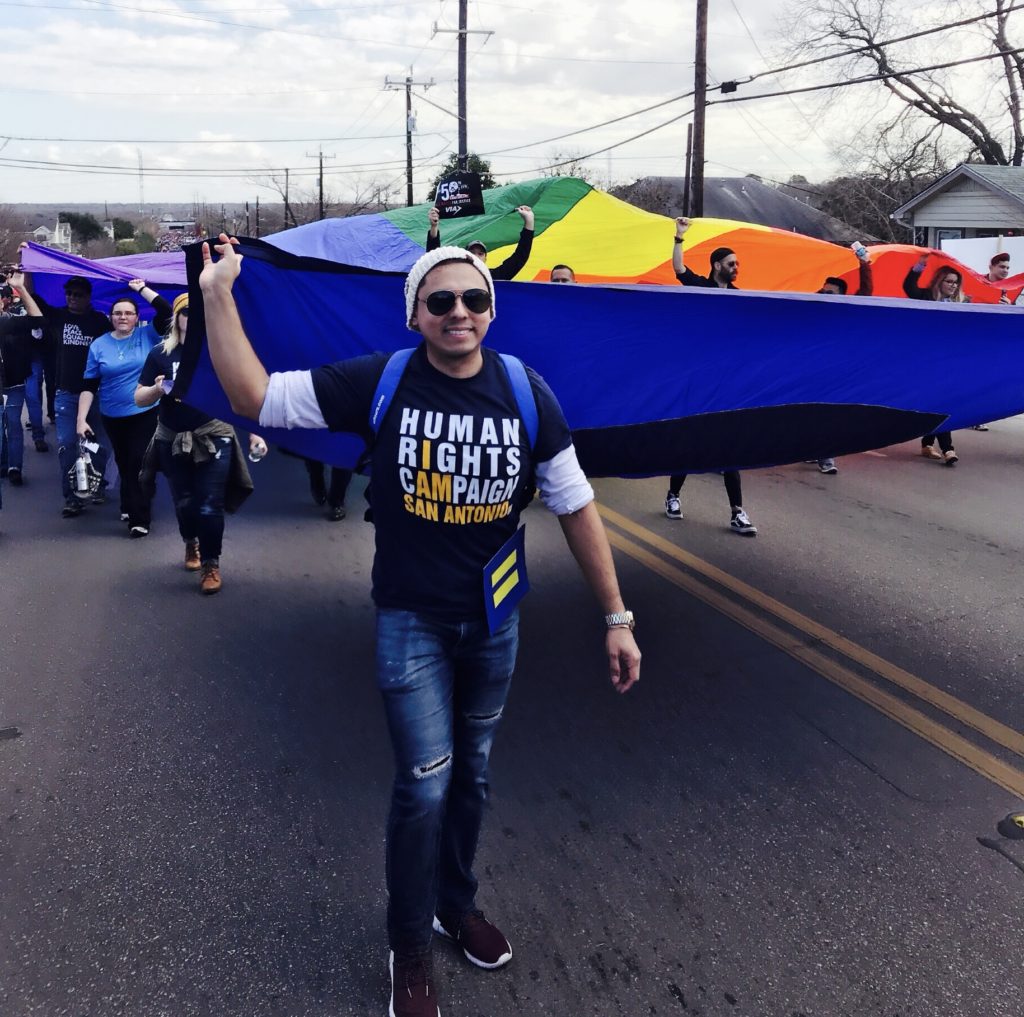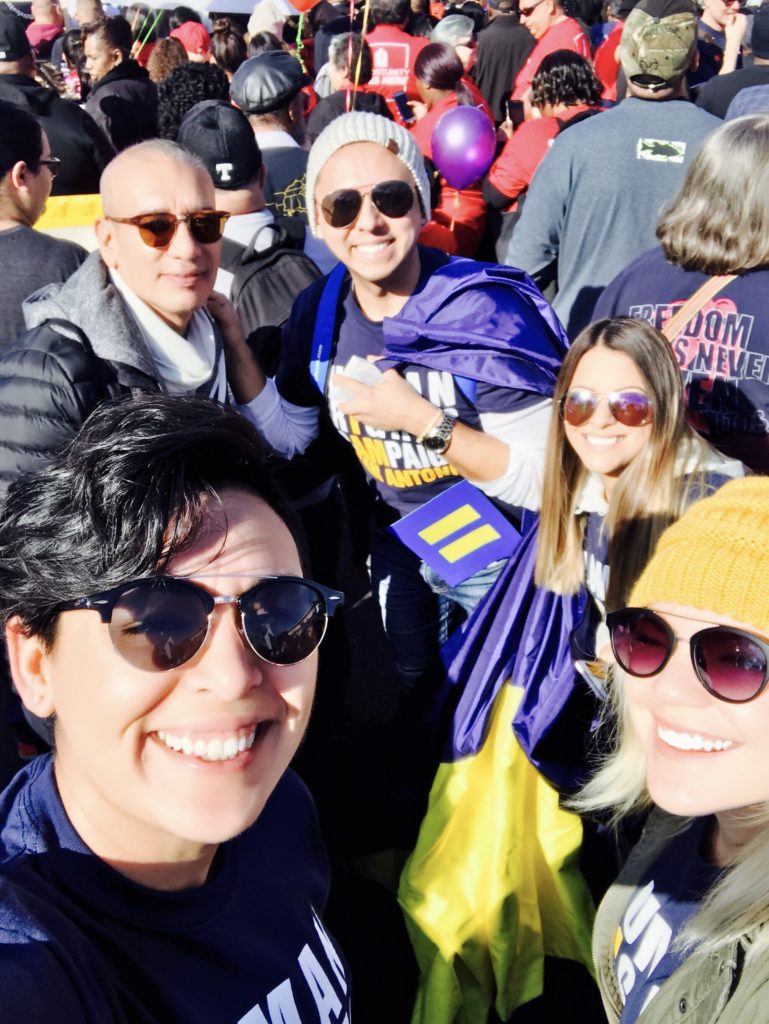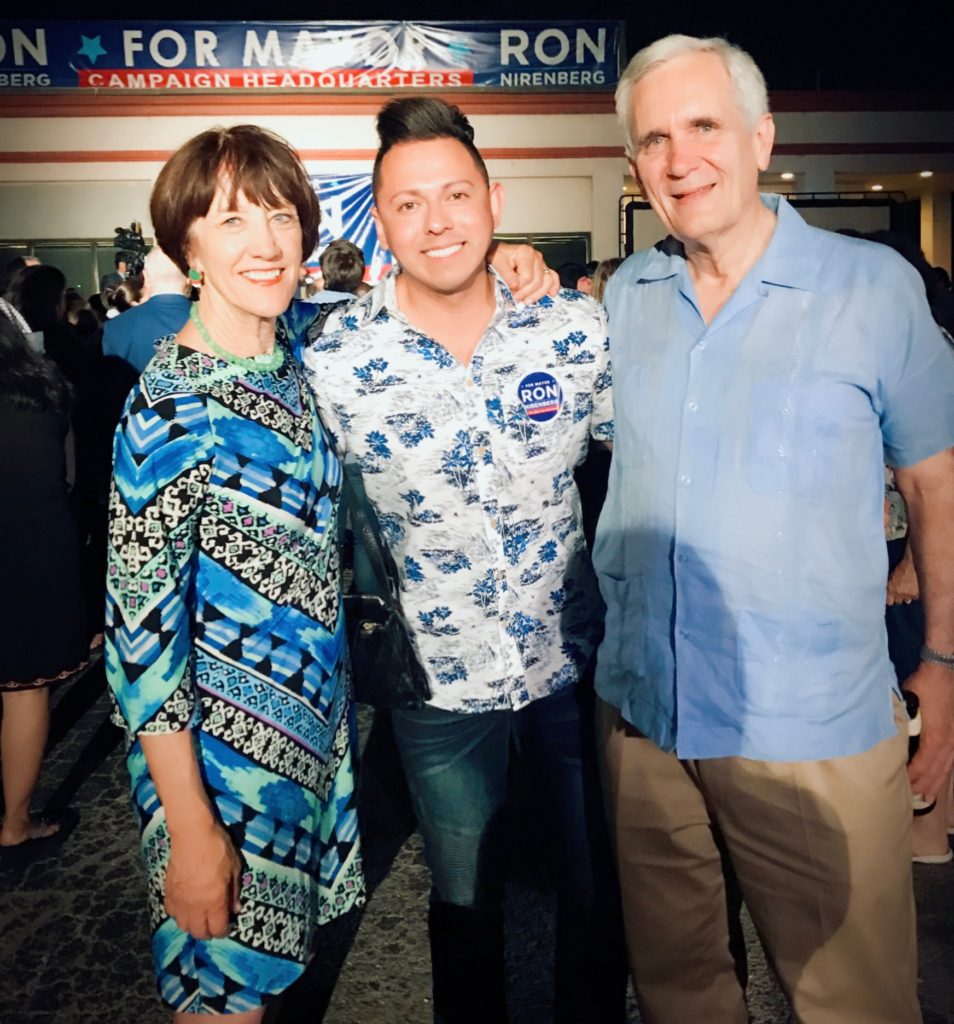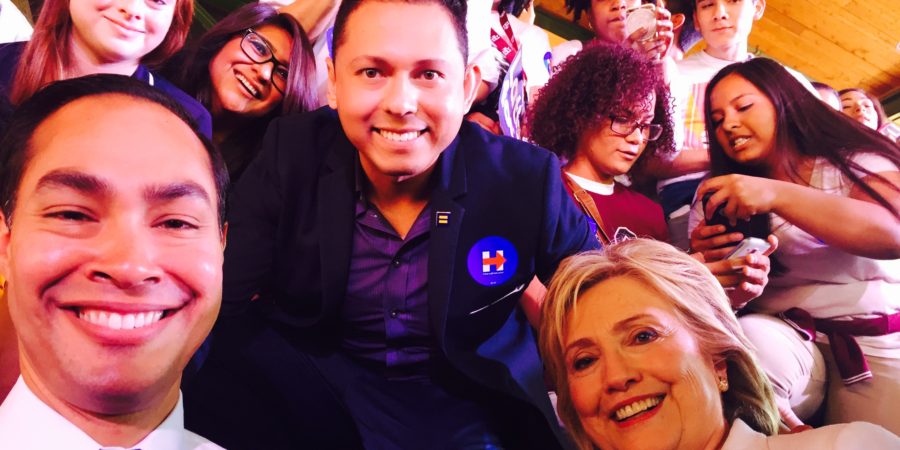Julian Tovar, a San Antonio, Texas, native now in his early thirties, knew he was gay as young as the age of seven. (Tovar is pictured above, in between former San Antonio mayor and U.S. Secretary of HUD, Julian Castro, and Hillary Clinton…no big deal.)
It wasn’t until high school that he felt ready to come out, and when he did, he didn’t quite get the reactions he expected. Much to his surprise, his close friends were shocked. And his parents did not understand, asking him to take drug tests and see a doctor.
Fortunately, over time, his family came around. But after witnessing throughout his life how LGBTQIA+ people were treated differently by society, he felt called to help create change. After learning about the Human Rights Campaign (HRC) in his late teens, Tovar became a member, and then a volunteer with the LGBTQ rights organization.
In time, Tovar became a member of HRC’s national Board of Governors, and he serves as the organization’s area representative for South Texas, which includes San Antonio. He’s also served as Vice-Chairman for the Board of Directors at Equality Texas…all in his spare time.
By day, Tovar works as a leader for one of the largest financial services companies in North America, having a hand in everything from diversity and inclusion to human resources to project management and strategic planning. It’s a juggling act, but one he takes very seriously. After seeing gay and lesbian families be denied the ability to adopt children, watching people experience rejection from families, and losing friends in the community to suicide who didn’t have enough support from loved ones, Tovar has felt compelled to fight for those who have struggled more than him. He carries these people in his heart, fueling his fight for equality.
Here is Tovar’s story of coming to terms with and coming out as gay, getting involved in activism, and what motivates him to keep on fighting for LGBTQ equality.
Profiles in Pride: Can you tell us about your journey to figuring out that you were gay and coming out?
Julian Tovar: I knew that I was gay at the age of seven. I didn’t know what it was called, but definitely knew that I had feelings that were different from other kids my age. My epiphany back at the age of seven was when I fell head over heels with a car salesman my parents were working with. I just knew that the attraction that I had for him was something that I hadn’t felt before.
I started learning early on that I had these feelings, not really sure what they were. But they would reoccur with other people I would end up meeting as I grew up. So collectively, all of those feelings, the tingling, nervousness, usually came around other boys or other guys. So I started kind of just doing a lot of exploration of, what does this mean?
I had met other people who were gay and friends of relatives or what not, but I didn’t necessarily know that’s what it was called. I just knew they were different. I also knew and recognized that they were treated differently, not necessarily always in a bad way, but just addressed differently, or people always had a unique way of interacting with them. It wasn’t until I was a little bit older, around 13 or 14, that I started to really connect with other gay people to understand that we had a lot of the same feelings or similarities toward other people.
It was at the age of 16 that I understood fully that I was gay and knew that it was at the time still very much of a sensitive topic all around. In school, at home, with family, and with friends. So I navigated through that pretty carefully and made sure that I continued to do what I was doing – not telling anyone.
I knew my friends might think I was gay. I had been ridiculed and even bullied at one point because others at school thought I was gay. In high school, I wasn’t doing typical teenager stuff. I enjoyed hanging out with older adults, older people than me. I enjoyed a more sophisticated, laid-back setting rather than out and about being wild and crazy. So that unto itself separated me from a lot of the crowd.

I also knew that I had really good friends, and I didn’t want to ruin those relationships. I wasn’t really sure how to approach it, or just let it be. So I did do that for a few more years, and it was in my sophomore year of high school that I met someone at during our summer band camp. I was quickly drawn to them, and found them intelligent, sweet, and caring, and knew that they had the similar feelings toward me. It was very much of a friendship at first, and we were both trying to come to terms with exactly what we had in front of us.
It was because of him that I learned a lot about what it meant to be gay. He was almost two years older and had begun his own self exploration about what it meant to be gay. He showed me the things to be cautious about and things to learn about in regards to the gay community. He had an interest in being a health professional, so he educated me a lot about sexual health, awareness, drugs, and alcohol. At first, he may have been somewhat of a mentor to me, but our friendship quickly grew into a romantic relationship.
It was because of that relationship that I decided that I needed to say something about it and be expressive about it. It was the first time I felt in love with someone. He was my first true love. Like most people who fall in love, you want to tell everyone about it, scream about it at the top of your lungs how happy you are and share this amazing feeling with everyone. A year after he and I had been together, we decided to start sharing with our closest friends.
During this time I totally came out and began having conversations with my best friends. Some were surprised and shocked, which was surprising and shocking to me, because I felt like, “You’ve been with me my entire life, and how did you not know this?”
Telling our friends was an interesting journey. Each of our best friends reacted differently. Some needed time to process and understand, and others immediately embraced us. In the midst of telling our friends, we also told our parents. While his mother took the cool and understanding approach to learning her son was gay, my parents took a slightly different approach. They immediately were concerned: “What does this mean for us? What are we going to say and how are we going to handle this?” We were together for four years. He decided to take a different path and join the Navy.
I went through some of the typical actions that take place usually after coming out. My parents immediately thought I was into drugs or alcohol. They were taken aback because I’d always been an A/B type student and did really well, President of Student Council or Vice President of National Honor Society, stuff like that. So this was very difficult for them. They thought I was being badly influenced by my surroundings and people that I was hanging out with.
I dealt with the runaround of, “We’ve gotta go talk to your teachers, you have to go to the doctor, you have to take a drug test.” I tried expressing, “I’m really OK.” It was everything that I had read about as possibilities, those things happening, so mentally I was aware of it and prepared for it. I had the back and forth arguments with my parents, and they just didn’t understand at first. I had moments where I emotionally shut down. Mostly because I was scared and sad and unsure of what I had just unfolded in my life.
Fortunately for me, that wasn’t very long-lived. My family started to find a way to find acceptance with me being gay. However, due to not wanting to cause any more pain amongst my family, I separated my personal private life with my family life. Ultimately, this is what led me into activism. I needed something to do with my time that was away from my family. Activism and advocacy really was the one thing that I could be involved in and feel like I was making a positive difference.
I got heavily involved in volunteerism and started finding ways to serve the community. Not necessarily LGBT-related, but just ways of helping others, like community giving and service. Naturally through that type of work, I met other LGBT people and began to grow friendships within those circles and really start to explore the LGBT community a little more broadly.

PIP: When did you start getting involved with activism specific to the LGBTQ community, and what led you from there to HRC?
JT: I’d say specifically with the LGBT community, around the age of 17. I had done work early on, but I didn’t know I was serving the LGBT community. For example, I would help with HIV/AIDS awareness or spend time at the local clinic, but all I knew is that I was helping people that were ill. It wasn’t until my late teens that I became aware that I was helping gay men affected by this horrible disease. I had heard about the Human Rights Campaign when I was 16.
Initially, it was mentioned to me by my boyfriend in high school. He was always educating himself, and by default, informing me. He held a very high regard for the organization due to the work they were doing across the country. It was also one of the organizations that existed with a lot of information regarding the LGBT community on the Internet.
At the time, I remember thinking it would be great if I could be a member, but when you’re young, living away from home, and on a budget, you think $5 a month is a lot of commitment! I was like, “I don’t know if I’m ready!” I remember one of my friends told me, don’t ever fill out your information on those types of things because people you don’t want to know that you’re gay will have a way to find that information out.
So I remember thinking when I turned 18, you know what, I’m gonna do it, I don’t care if people start finding out, I want to be a part of whatever this organization is and what they stand for. I didn’t know a whole lot about what they did specifically, but it was a way to be connected. I felt empowered by seeing other people with the same equality bumper sticker that I had on my vehicle. It was a way for me to feel like there were other people out there like me, or at least that support who I am.

So, I’ve been involved ever since. I started off just volunteering from time to time on different things in different cities, and bringing along my friends. Like other things that you volunteer for, you come and you go over time. It was in the last six years that I got more involved in leadership roles with other LGBT organizations, such as Equality Texas.
I wanted to do more. At the time, I knew that my trajectory did not include building a family. However, I had a lot of good friends who wanted to build a family and was running into heartbreaking roadblocks of not being able to adopt or not being able to keep someone because they would be found out as being in a same-sex relationship.
At the time, that really ignited the work for me to want to do something for them, because they had their own sets of challenges ahead of them. They were trying to raise their families and I wanted to help them. I really inserted myself into activism because I didn’t want to see any more of my close friends in loving and caring relationships not able to build a dream of having a family.
Seeing them struggle so badly with the stereotypes and the discrimination really kept me involved to create change of how people saw them and how people responded to them. I really wanted to change the hearts and minds of our community in a way that embraced my friends and their families. I felt it was the least I could do compared to the bravery that it takes for them to put themselves out there to give their children as normal of a life as possible.
So I wanted to change hearts and minds specifically because of friends like that, so that’s kept me on the path of doing that for others, such as the transgender community. My reason or my purpose changes of what drives me to serve others. At the end of the day, all that matters to me is that I continue to help other people, no matter how hard the struggle.

PIP: What are some of the biggest challenges facing the LGBTQ community that you’re currently involved in and fighting for?
JT: From a national perspective, the Trump-Pence Administration is by far the most anti-LGBTQ administration that we have ever seen and our biggest challenge. As part of the Human Rights Campaign, we are actively fighting and demonstrating the power of resistance. We are pushing back on absurd attempts to target the LGBTQ community while building a force to elect pro-equality candidates through our largest grassroots deployment in HRC’s history. Endorsing and electing pro-equality candidates across the country will be a key part to helping us halt the dangerous Trump-Pence agenda.
From a statewide perspective, the same holds true. Except it is not an administration that is dangerous, it is legislators that continue to push discriminatory legislation at the state capitol. In Texas, we have a high priority to achieve basic equality in areas of parenting laws, non-discriminating laws, relationship recognition and religious refusal laws, hate crime laws, youth laws, and health and safety laws — all areas that impact LGBTQ individuals.
The other challenge is getting people to understand that this is more than just politics. We are not fighting for a political party, we are fighting for lives. To help lives. To keep lives. To protect lives. To ensure that someone’s life is treated with dignity and respect, equally and fairly.

PIP: Do you feel like the initial lack of acceptance from your family has shaped you as an activist and driven you to help others in the LGBTQ community?
JT: Yeah, I definitely think so. I think there’s a lesson to be learned in everything, so that certainly drove me to have some sense of what people go through. I do recognize that there are many, many, many people that have had it 100 times harder. Those are the people I really keep in my heart when I do this work, because I don’t take one day for granted. I feel like the experience I went through, as uncomfortable and tumultuous as it was at different times, in all regards to what other people have gone through, was probably fairly easy.
It was not more than I could handle. But I think about the experiences that other people go through. Some of those experiences lead to them feeling that they can’t go on. I’ve had friends that have taken their own life because the amount of scrutiny and hate that they felt from their own family drove them to feel that they could no longer live, or to a place that was so painful that they didn’t want to continue to go on.
So I carry the people I’ve met and the people I’ve known, and even those I don’t, really close to me when I do this work, because I know my experience could have been different as well. I think about all the others who are going through a much harder time, even today. I think a lot of people forget that, even though LGBT is a little more mainstream and discussed openly and there’s broader acceptance and sensitivity to those topics than ever before, the conversations that happen in peoples’ homes with their families can still be and still are very difficult.
Just because your parents watch Will and Grace doesn’t necessarily mean you can be a Will or Jack in your family. What I’ve seen and experienced through the work I’ve done is that it is OK until it’s your son or daughter. That’s when things change for people. So going through what I did early on with my family opened my eyes to the possibility of what it could have been and what is was not.
I’m very fortunate that the small piece of negativity of my coming out didn’t grow into a lifelong estrangement from my family. My parents are more supportive and loving now more than ever – embracing all aspects of my life and who I love. I’m not sure I would change any part of my life and how things unfolded when I came out. It’s shaped who I am today and is part of the foundation of who I will continue to be.
PIP: That’s great perspective. I know a lot of us in the community face challenges with our families getting fully on board, but it’s a good reminder that things often could be worse and will get better.
JT: Let me tell you, it can always be worse. I have experienced heart-wrenching days in my life and I know I can survive some of the most difficult situations; we all can. If there’s anything that keeps me going it is the thought that on the other side of every storm is a greater sense of joy. And you have to hold onto that, even when things get really tough.

